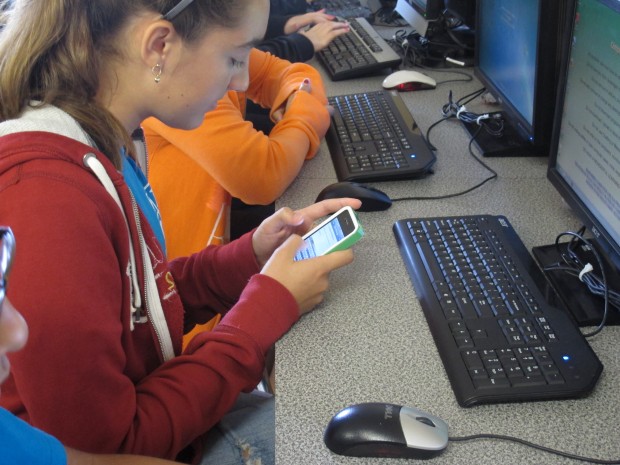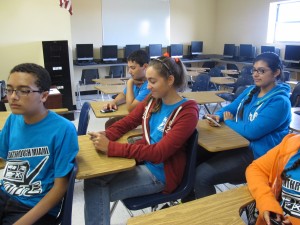How Schools Are Coping With A Communications Obsession

Sarah Gonzalez / StateImpact Florida
Katerina Sanchez, 14, uses her phone when her classmates move from their desks to work on the classroom computers.
Many schools prohibit students from using cell phones during school hours.
But students can’t always resist the urge.
Middle school student Teresa Fernandez says she leaves class and goes to the bathroom when she wants to text.
“I think everyone does that because every time I go in there people are playing [games] and texting,” Fernandez says.
Instead of fighting students, adults should give in, says Larry Rosen, a psychology professor at California State University, Doninguez Hills.
Rosen is author of “iDisorder: Understanding Our Obsession with Technology and Overcoming Its Hold on Us.”
He suggests a radical idea: teachers should let students use their phones for one minute – every 15 minutes.
It’s like a nicotine patch for people trying to quit smoking.
Rosen says constantly thinking about their phones is more distracting to their learning than letting students have a minute or two to do it.
How Often do Students Think About their Phones?
A 2011 study by the Pew Research Center’s Internet and American Life Project teenagers between the ages of 12 and 17 send and receive an average of 167 text messages a day.
The median is 60 texts per day.
The Pew study also finds about half of teens visit social networking sites several times a week or more.

Sarah Gonzalez / StateImpact Florida
Student Ciji Wright, 13, says she gets distracted during class by thinking about checking her social media sites like Facebook and Instagram.
“I think about my Facebook 24/7,” says 13-year-old Ciji Wright.
The Brownsville Middle School student says a classroom lesson doesn’t always distract her from thinking about her social world.
“I might be in English class and I’ll get bored and I’m like, ‘I wonder what’s happening on Facebook? I wonder who is about to follow me on Instagram.”
Students think about their social communication so much that 7th grader Mikayla Alsopp says her mind starts to play tricks on her.
“Let’s say your phone is on vibrate,” she says. “You just start hearing things. You’ll hear the vibrate.”
A Different Brain than Teachers Taught 10 Years Ago
Today’s teen brain is literally a different brain than teachers taught 10 years ago, Rosen says.
And it may be time for schools to adapt.
He thinks banning cell phones in class is the wrong approach.
“From the point of view of what’s going on in those kids’ brains, it’s a terrible idea,” Rosen says. “Absolutely terrible.”
He says just knowing that they can check their phones in class will calm their brains enough to keep them focused on a lesson until the next cell phone break.
“It’s a stimulus to your brain that says, ‘You don’t have to think about me, what you’re missing out on. All you have to do is listen and pay attention for 15 minutes and you’ll get to check in.”
His experiments show teens and young adults start losing focus after 10 or 20 minutes.
It’s not proven whether these one minute breaks have a direct affect on student learning, but Rosen says any little break resets the brain’s ability to focus.
A Generation Apart
The people making school rules don’t always get it. Most are Generation X or Baby Boomers. They didn’t grow up with the same technology.
Take Shawn Cerra. He’s been principal at JP Taravela High School in Coral Springs for the past 10 years.
“I can’t necessarily relate because none of this stuff was really around when I was in high school,” he says.
“I would hope that kids can dedicate six hours of total time to their education.”
High school students Marlene Nazario and Katerina Sanchez say it would be “pretty cool” if teachers let them text in class.

Sarah Gonzalez / StateImpact Florida
StateImpact Floirda asked students to place their phone on the desk if it was within reach. Each student in the classroom pulled their cell phones out of their pockets, and couldn't resist the urge to check for any missed messages.
But other students say it would only make their addiction worse.
“It’s like giving someone a little bit of food when they’re really hungry,” says student Ciji Wright.
“You’ll be like when am I going to get my next meal?”
Principal Cerra is “totally against” the idea of one minute cell phone breaks.
He says it would be difficult to get students back on task every 15 minutes.
“If they see something that’s upsetting or disturbing or something of interest, it would be hard pressed for them to put the phone down and listen to World War II,” he says
“I want my teachers and students to follow the rules that the school board has set,” he says.
In Miami-Dade County, there is a similar belief that cell phones should not be used in the classroom for things such as texting friends and checking social networking sites.
But teacher Mariolga Locklin agrees it may be time to rethink the policy.
Locklin teaches 12th grade English at Miami Palmetto High School. She says adults are also distracted by their phones.
“If somebody says something, I will Google it to double-check what they say while the other person is talking,” Locklin says.
“So I understand completely when students want to do the same thing.”
She lets her students use their phones.
She admits that most of the time her students are not Googling something for class, though.
“It’s mostly Facebook,” she says.
But it doesn’t bother her.
“Because usually it doesn’t interrupt the lesson. If it’s one kid out of 30 checking one thing, it’s not that big a deal.”
She says the challenge for teachers is to keep students interested in the lesson, so they forget about their cell phones – even just for a little while.
“If they’re not interested in the class they’ll be passing notes to each other, they’ll be doing homework from another class, so it’s not just the phone,” she says.
“If I’m keeping them interested, I don’t have much of a problem with the phones.”
